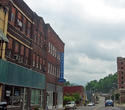For more than fifteen years, I spent a considerable amount of my professional time in the company of oil men. For years I ate lunch with them, traveled with them to places like Scotland and Russia, listened to their war stories over drinks, watched them unfurl seismic charts on board tables, read their budgets, and marveled at their forecasts — all of which predicted finding the next Prudhoe Bay, North Sea, Bass Strait, or Caspian Sea, no matter where they looked. In one meeting, I heard of a vast store of gas under, alas, the walls of old Jerusalem. read more »
A New War Between The States
Nearly a century and half since the United States last divided, a new "irrepressible conflict" is brewing between the states. It revolves around the expansion of federal power at the expense of state and local prerogatives. It also reflects a growing economic divide, arguably more important than the much discussed ideological one, between very different regional economies. read more »
Going Underground in Australia
Just over a decade ago, governments in Australia were immune to calls for accelerated infrastructure investment in our major urban centres. Plans for strategic reinvestment were rare. Much has changed in that time, maybe too much. It seems that enthusiasm for major urban infrastructure now runs ahead of impartial assessment of the cost, versus the claimed benefits. A proposed $8.2 billion underground rail loop for Brisbane, along with a new underground station for its busy downtown, provides one example of an over exuberant propensity to spend. read more »
Driving and Transit in America: Myths from Down Under
I nearly fell off my bicycle when I read that driving had declined 43% in the United States and transit use had increased 65%. Australia's The Fifth Estate attributes these figures to Professor Peter Newman of Sydney's Curtin University at an event at the Hassell architectural and urban planning firm offices in Sydney. In speaking about a declining driving trend in Australia, The Fifth Estate reports Professor Newman as saying that:* read more »
Chickens from Wal-Mart?
As I arrived for a visit, my 90 year old father was perusing ads from his favorite big box store for chicken parts. Seizing the moment that all children savor, I sought to impress him with my declaration: "I buy my chicken parts – albeit at higher prices – at the natural foods store; you know daddy, where the chickens ate naturally off the barn yard floor like they did when you were a boy"? Not missing a beat and dashing my hope for an "at a boy," he retorted: "I saw what those chickens ate off the barnyard floor and I'll buy my chickens at Walmart(s)!" read more »
The Decline and Revival of an American Suburb
In 1952, a white Protestant couple from Pasadena, California along with their newly born first child, moved 22 miles east to a small town called Covina. There, among acres of open space and endless rows of orange, lemon, and avocado trees, the young family was able to purchase a plot of land and build a brand-new home with swimming pool for a total of $20,000. read more »
Tribes And Trust
Only Tribes held together by a group feeling can survive in a desert.
--Ibn Khaldun, 14th century Arab historian
Time to chuck into the dustbin the cosmopolitan notions so celebrated at global conferences: a world run by wise men of the United Nations, science-driven socialists or their ostensibly more pragmatic twins, global free marketers. We are leaving the age of abstractions and entering one dominated by deep-seated ethnic, religious and cultural loyalties, some with roots from centuries and millennia ago. read more »
We Trust Family First
Americans, with good reason, increasingly distrust the big, impersonal forces that loom over their lives: Wall Street, federal bureaucracy, Congress and big corporations. But the one thing they still trust is that most basic expression of our mammalian essence: the family. read more »
Distilling China’s Development
The economic rise of China has created two growth industries pulling in opposite directions. There’s either the school of blind praise of ‘The China Miracle’ or its opposite, apocalyptic predictions about the country’s impending implosion. read more »
How Texas Avoided the Great Recession
Lately, Texas has been noted frequently for its superior economic performance. The most recent example is the CNBC ratings, which designated the Lone Star state as the top state for business in the nation. Moreover, Texas performed far better than its principal competitor states during the Great Recession as is indicated in our How Texas Averted the Great Recession report, authored for Houstonians for Responsible Growth.
Introduction: How Texas averted the Great Recession: read more »





















